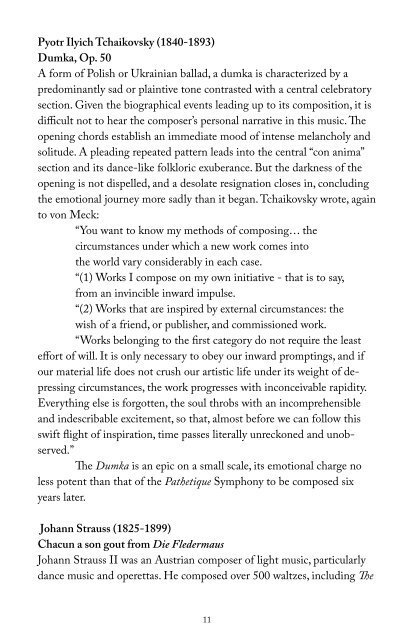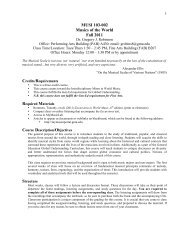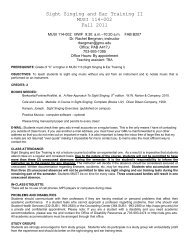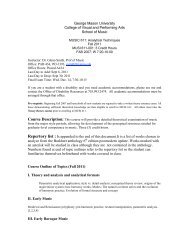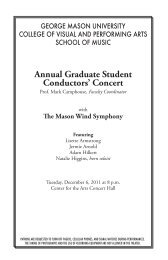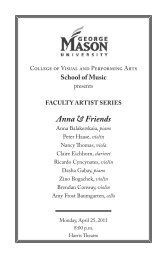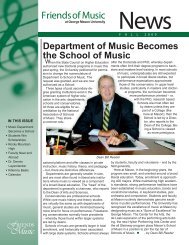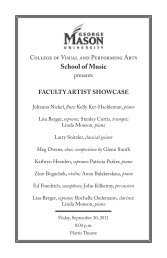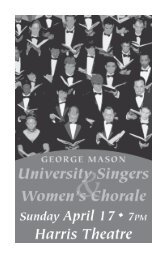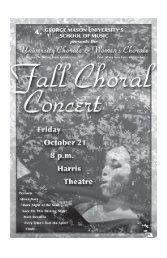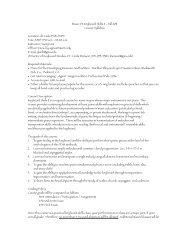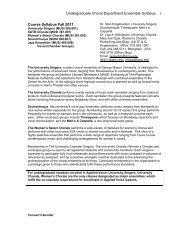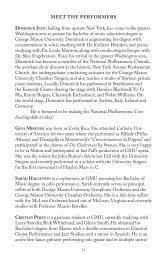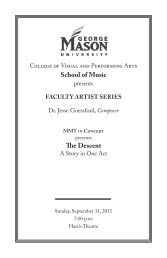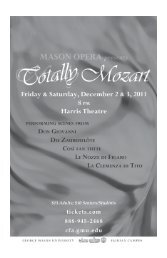complete recital program - George Mason University School of Music
complete recital program - George Mason University School of Music
complete recital program - George Mason University School of Music
You also want an ePaper? Increase the reach of your titles
YUMPU automatically turns print PDFs into web optimized ePapers that Google loves.
Pyotr Ilyich Tchaikovsky (1840-1893)<br />
Dumka, Op. 50<br />
A form <strong>of</strong> Polish or Ukrainian ballad, a dumka is characterized by a<br />
predominantly sad or plaintive tone contrasted with a central celebratory<br />
section. Given the biographical events leading up to its composition, it is<br />
difficult not to hear the composer’s personal narrative in this music. The<br />
opening chords establish an immediate mood <strong>of</strong> intense melancholy and<br />
solitude. A pleading repeated pattern leads into the central “con anima”<br />
section and its dance-like folkloric exuberance. But the darkness <strong>of</strong> the<br />
opening is not dispelled, and a desolate resignation closes in, concluding<br />
the emotional journey more sadly than it began. Tchaikovsky wrote, again<br />
to von Meck:<br />
“You want to know my methods <strong>of</strong> composing… the<br />
circumstances under which a new work comes into<br />
the world vary considerably in each case.<br />
“(1) Works I compose on my own initiative - that is to say,<br />
from an invincible inward impulse.<br />
“(2) Works that are inspired by external circumstances: the<br />
wish <strong>of</strong> a friend, or publisher, and commissioned work.<br />
“Works belonging to the first category do not require the least<br />
effort <strong>of</strong> will. It is only necessary to obey our inward promptings, and if<br />
our material life does not crush our artistic life under its weight <strong>of</strong> depressing<br />
circumstances, the work progresses with inconceivable rapidity.<br />
Everything else is forgotten, the soul throbs with an incomprehensible<br />
and indescribable excitement, so that, almost before we can follow this<br />
swift flight <strong>of</strong> inspiration, time passes literally unreckoned and unobserved.”<br />
The Dumka is an epic on a small scale, its emotional charge no<br />
less potent than that <strong>of</strong> the Pathetique Symphony to be composed six<br />
years later.<br />
Johann Strauss (1825-1899)<br />
Chacun a son gout from Die Fledermaus<br />
Johann Strauss II was an Austrian composer <strong>of</strong> light music, particularly<br />
dance music and operettas. He composed over 500 waltzes, including The<br />
11


